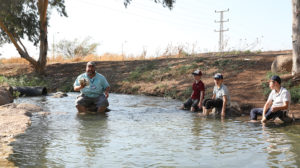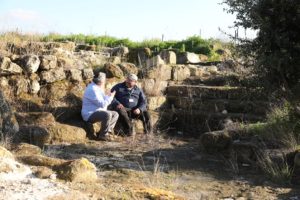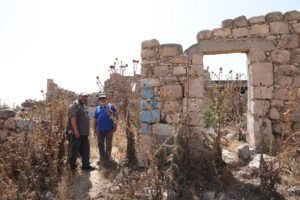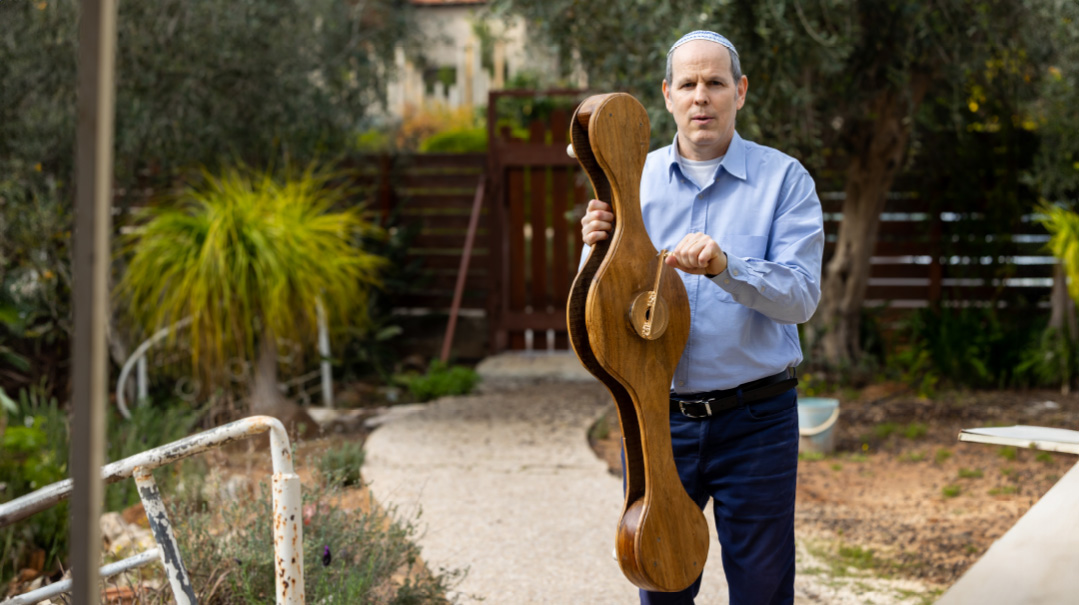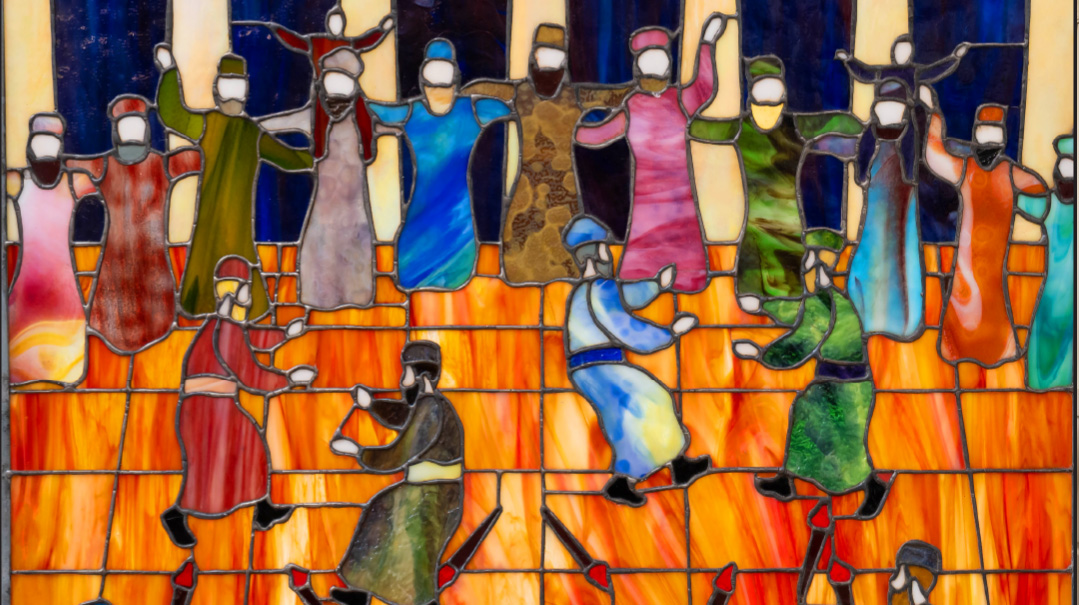Happy Campers
| June 20, 2018The unsung heroes who fix storm damage, exploded pipes, collapsed roofs, and vandalism wreckage make campgrounds habitable once more for another unforgettable summer
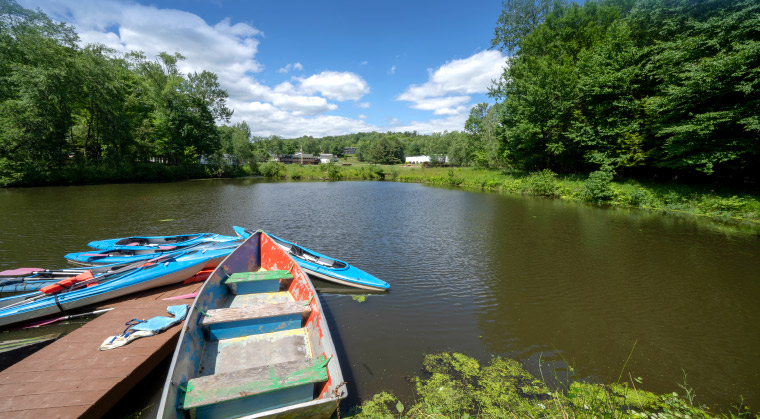
(Photos: Benjamin Kohen)
Spring Cleaning
W
hether you loved camp or hated it, chances are that at some point, you’ll be waving goodbye to your own kids as they board the camp bus. Later, you’ll hear all about color war, sports, and the major trip. But what you won’t hear about are the nuts and bolts that underlie all those amazing experiences, and the unsung heroes who make it all happen, year after year. While for eight weeks, the campgrounds are pulsating with summer fun, those golf carts have been rumbling along the shady paths from office to bunkhouse to basketball court and pool long before opening day, and will continue to roll long after the banquet is over.
There’s still a week until the kids pack up and board those buses, but for the ground crew, it’s been summer season since early spring. After a pounding winter, it takes an entire staff to fix storm damage, exploded pipes, collapsed roofs, and vandalism wreckage, but the men behind the scenes — the maintenance workers who make campgrounds habitable once more — are happy to help make another unforgettable summer.
In the Catskills, preparations for the coming camp season move into high gear in early spring. The maintenance manager and his crew are among the first people to start getting things ready on-site, facing the annual challenge of making the sprawling complexes and acres of land habitable again.
First, they take stock of any storm damage. Trees fallen on structures or wires, exploded pipes, and roofs that have collapsed under heavy snowfall are the most common scenarios. “There could also be some vandalism to the camp property,” says J.S, who has worked as part of the maintenance team in several New York boys’ camps, “but thankfully that’s not so common. Years ago, when all the pipes were made of copper, vandals could come during the off-season to cut away the copper, but today the pipes are made of plastic or PVC, which no one wants to steal.”
To fix up the winter damage, some buildings will be renovated, and many freshened up. In Camp Agudah in Ferndale, a crew of between 20 and 30 workers is involved in painting and cleaning.

Safety Net
B
ut it’s not only about a fresh coat of paint. “In camp, it’s always safety first,” says Rabbi Yosef Newhouse from Machaneh Bais Yaakov. “Every building needs to be checked for fire safety, for broken windows, stuck doors, tripping hazards. We have to check that each bed is secure. We also get the water back on; it’s turned off over the winter to prevent pipes from freezing and cracking.”
Safety doesn’t just remain in the hands of the camp administration, though. To open up for the summer, each camp needs a permit from the state’s Department of Health. Officials check the smoke detectors and emergency lights, inspect the infirmary for satisfactory first-aid provisions, and test a water sample for the presence of harmful bacteria.
Yossi T., who spent several summers as part of a maintenance crew at boys’ camps in the New York area, recalls one camp where there was a problem with E. coli — a potentially dangerous bacteria found in animal waste — in the water system. Twice, the camp sent samples to the state, and they were found to be contaminated. “It was crazy — a week and a half before camp began and the water was unsafe. We were thinking of bringing in water tanks, but even that would not help if the contamination was in the underground well that was our water source,” Yossi recalls. “Thankfully, the inspectors recommended a cleaning method for the entire water system and it worked. The third water sample we sent in was fine, and we received the permit.” Parents can relax, because there is usually another full state inspection during the summer, an unscheduled visit when camp is in full swing, when safety will be reassessed and water checked again.
But the most dramatic tale of pre-summer emergency definitely belongs to Camp Agudah. In the summer of 2006, a raging fire destroyed much of the camp just six days before camp was to begin. The camp office, kitchen, and dining rooms, as well as some of the staff sleeping quarters, were consumed in the nighttime blaze. Those who thought that camp wouldn’t happen that year underestimated the sheer energy and tireless devotion of longtime camp director Reb Meir Frischman. He cut through red tape to make sure trailers were transported to house the families whose homes had been burned down, the plumbing was reinstalled, and a supply of propane and electricity was hooked up to the tents that were brought in to make a makeshift kitchen and dining room. It was a job that should have taken months, but that year, camp started just a few days late.
“Our staff stepped up to the plate and displayed exceptional teamwork in streamlining the process,” says Rabbi Shimon Newmark, Camp Agudah’s current director and Frischman’s hand-picked successor. “And it certainly helped that the parent body was very understanding and supportive.”
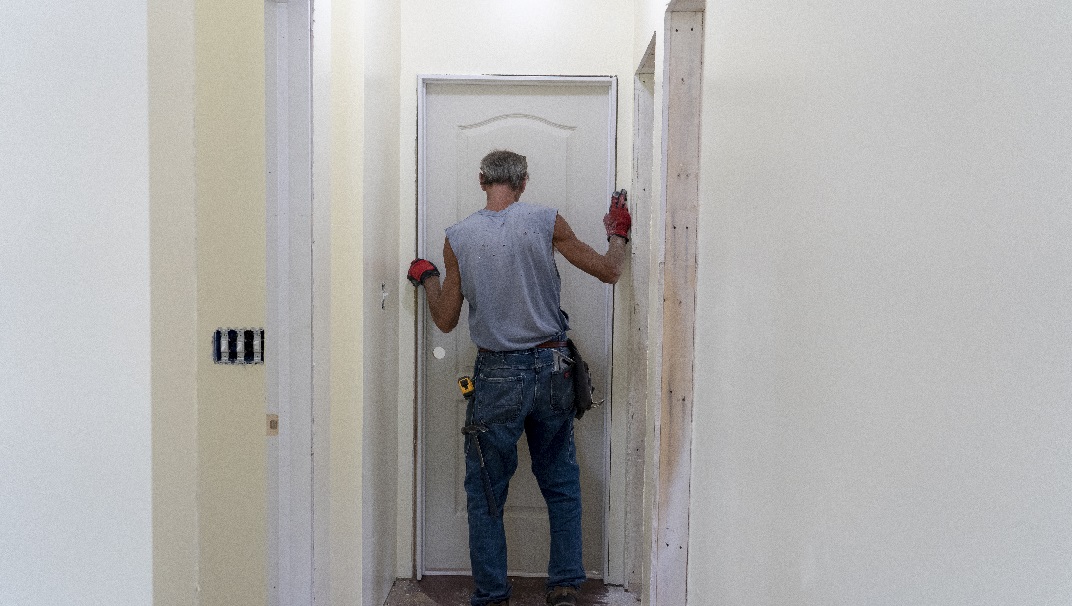
Quick Fix
A
s opening day looms closer, the maintenance team gets instructions about the number of campers in each bunk, and moves on to setting up the bunkhouses and then the dining room, social halls, and in the boys’ camps, the beis medrash. Boats and outdoor equipment have to be checked for safety, the food orders are made, and it’s almost time for the first buses to arrive.
Once camp begins, the tranquil country air fizzes with new energy. The PA system crackles to life, counselors’ whistles and sounds of cheering are carried on the breeze, and excited kids swarm over the carefully-prepared grounds and sport fields. Endless luggage has to be transported to the right buildings, and life becomes a little more interesting for the maintenance team. Yet they say they don’t appreciate being bombarded with requests from youngsters as they work, or having to answer to kids who come over to say, “Hello, my shelf is broken.”
“The camp has an effective procedure to get these things done, so campers are not supposed to approach us themselves,” says Mendel Kaplan of Camp Ruach Chaim. Officially, campers should report anything that needs attention to their counselor, who will fill out a form in the camp office. The maintenance team checks the forms in the office, as does the camp director. “If it’s an emergency, he’ll text us or radio a message right away. Stuffed toilets, water, and drainage issues are a priority, so we’ll be there very fast to deal with those.”
At Machaneh Bais Yaakov, there is an internal phone line for maintenance issues and requests. Anyone — staff and campers — can call and leave a voicemail. Rabbi Newhouse says that an average day of camp yields between 30 and 40 requests. “There is a lot of variety in those voicemails,” he says. “Campers call in to let us know that some of the phones, or the hot water system, are not working properly. Sometimes they request extra garbage cans or collections. Occasionally, there’s an animal in a building that we need to take care of. Probably the most interesting request we received was, ‘Could you please install an ice-cream machine by the pool? It’s really hot over there.’ We declined.”
Creaking beds are another common complaint. Camp maintenance crews will often use a strap or piece of wood to attach the beds to the wall to prevent them from moving. As for stuffed toilets, the hardworking maintenance men give a collective groan. If only the kids would remember to flush only flushable items, there would be a lot less plumbing problems to deal with.
The camp cleaning crew is responsible for sweeping and mopping the floors, but when clothing and personal belongings are strewn all over it, they can’t get through to do their job. “The one thing I would tell campers is to keep their clothing and laundry off the floor,” says Kaplan. “Especially when it’s wet, it’s going to go moldy if it’s left there. Funny thing, from what I’ve seen, the boys usually end up picking up their stuff at some point, while in the girls’ camps, sometimes clothing gets left on the floor until the end of the season.”
With all their grumbling, the best thing about working in camp, say these men, is that the fun is contagious, bringing wonderful summer experiences to a new generation. “I was brought to camp when I was less than two weeks old, and three of my kids were born in camp during the summer,” says Mendel Kaplan. “To work here and watch the fun going on is great.”
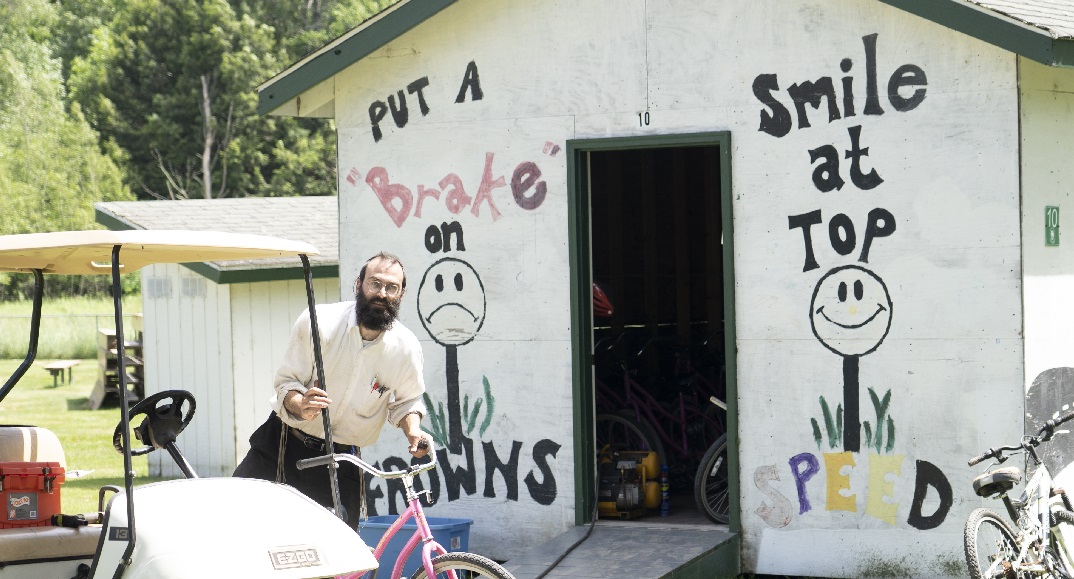
Blackout Blues
Benign as the summer weather usually is in the mountains, heatwaves, storms, and hurricanes are possibilities that every responsible camp director takes into consideration. Nowadays, camps are equipped with temporary generators for emergency backup. But during a storm blackout, for example, when only one lightbulb and one outlet (for a fan) are working in each bunkhouse, it takes a skilled staff to foster a spirit of camaraderie and adventure, keeping campers calm and happy.
One memorable Friday afternoon during the girls’ half of 2016, Camp Agudah Toronto was hit by a storm. It was clear that there would be no electricity till Sunday. Shabbos loomed ahead in darkness, as maintenance manager Mr. Basch and his team quickly hooked up some kitchen lights to the small generator that was available. In the end, the creative camp staff rushed to bring in Shabbos at the earliest possible zeman and started the seudah early, while it was still light. Afterward, the non-Jewish staff drove the golf carts to lead the way back to the bunks through the darkness.
Extreme weather can also cut camp off from the city and change trip or activity schedules. Back in August 2011, Hurricane Irene struck the East Coast the night before the end of camp. Rabbi Newhouse remembers the following day as a “major challenge.” The roads were closed and the buses couldn’t get through, so getting everyone home was difficult. In addition, the electricity and water systems both went down. “Now we have a private generator, but that year we didn’t,” Rabbi Newhouse says. “Nevertheless, we had our backup systems in place and camp stayed calm, baruch Hashem. We were eventually able to get the campers home, and then it took two full weeks to get the electricity up and running again.”
For safety reasons, most camps will not allow children to sleep in any building without a smoke alarm. In the middle of one summer at Machaneh Bais Yaakov, lightning struck a cable connected to the fire alarm system. The maintenance crew had to set up a temporary system the same day so the bunkhouses could be used at night.
Since most camps run their utilities completely independently, there is no city hall to call for trouble-shooting or backup. The buck stops with the head of maintenance and the camp director, says Mr. Basch, who has up to 13 workers under him and who has been head of maintenance at camp Agudah Toronto for 17 years. Far from the city utility supplies, water in camp is often pumped up from chlorinated wells some forty or fifty feet underground, or is pumped from a local lake using a sophisticated filtration system. Sewage disposal also works on an independent system. These delicate services are installed by specialist companies, but the maintenance crew carries the responsibility. “Every summer without fail, at some point I’ll get woken in the middle of the night and told that there is no water for showers,” says Mr. Basch. “There’s no calling the city water department — I have to get out there and fix the water system.”
Likewise, maintenance crew member J.S. remembers one hectic Friday afternoon when the well pump broke. “All the water in camp just shut off. We had to check out if the problem was electrical, in which case we could hook up a temporary generator to the pump, or something else. It actually was something else. We managed to get a repair company to fix it temporarily for Shabbos and come back on Monday for a better repair.”
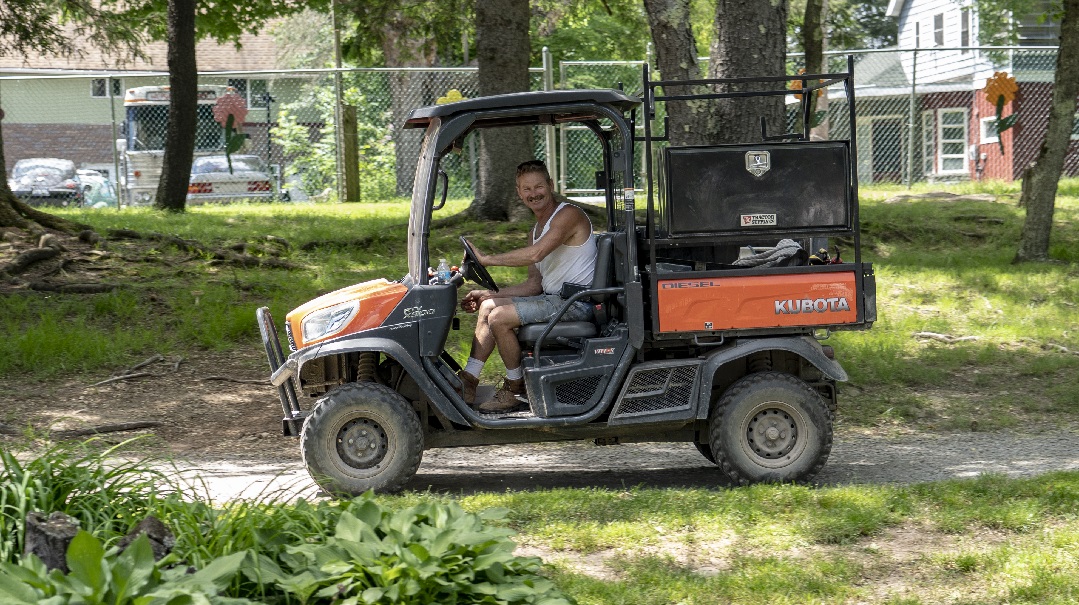
Skunk in the Bunk
The Catskill Mountains are a rich source of wildlife, yet it’s probably the skunk who takes center stage in camp folklore. When city kids return to civilization they are sure to bring tales of intruding skunks and atrociously pungent sprayings. Beyond the hype and the legends about bathing in tomato juice, skunks do actually enter camp buildings on occasion.
The animals and pests with which a camp contends depend on its location. In New York’s Sullivan County, coyotes, raccoons, skunks, beavers, and bears are all indigenous. “In terms of damage to property, beavers are the worst,” says Mendel Kaplan of Ruach Chaim. The semiaquatic rodents are prolific builders who build dams to create pools of still water where they will be safe from predators. Beaver dams are made of timber and mud and are notoriously difficult to remove.
Bears in camp are a parent’s nightmare. But although there are occasional bear sightings in mountainous and forest areas, careful waste management can go a long way to keeping animals away, and even if a bear does appear, the problem can usually be peacefully resolved. The general advice is to shine lights, or make noise, by blowing whistles or clapping hands, because bears will run away from human noise. But panic-stricken kids are likely to either freeze — or shriek, and screeching can make the bear panic, while running away can cause him to give chase. According to camp maintenance personnel, a better option is to back away slowly and carefully. Camp staffers stay vigilant for bears and are required to report any bear sightings.
J.S. says that when the staff arrives in the spring, they often find coyotes on the outskirts of camp, and raccoons who have made themselves at home. “The raccoons sit in the bunkhouses for a little warmth during the winter. By the time we get there, they’re gone, but they leave holes in the ceiling.”
Beehives are another nuisance on camp grounds that are neutralized by those heroic maintenance workers. A special hive spray is part of their equipment and the crew will deal with hives immediately upon discovery. Yossi T. remembers one incident when a worker didn’t realize there was more than one hive in a colony. He entered to spray one hive, but was attacked and stung by bees from another hive so badly that he needed hospitalization.
(Originally featured in Mishpacha, Issue 715)
Oops! We could not locate your form.


